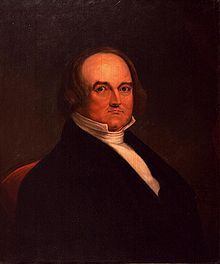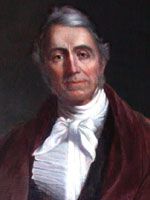User:-A-M-B-1996-/sandbox5
David Henshaw | |
|---|---|
 | |
| 14th United States Secretary of the Navy | |
| In office July 24, 1843 – February 18, 1844 | |
| President | John Tyler |
| Preceded by | Abel Upshur |
| Succeeded by | Thomas Gilmer |
| Collector of the Port of Boston | |
| In office 1829–1837 | |
| President | Andrew Jackson Martin Van Buren |
| Preceded by | Henry A. S. Dearborn |
| Succeeded by | George Bancroft |
| Member of the Massachusetts Senate from Suffolk County | |
| In office May 31, 1826 – May 30, 1827 | |
| Personal details | |
| Born | April 2, 1791 Leicester, Massachusetts, U.S. |
| Died | November 11, 1852 (aged 61) Leicester, Massachusetts, U.S. |
| Political party | Democratic |
David Henshaw (April 2, 1791 – November 11, 1852) was an American businessman, banker, and Democratic politician who was a leading member of the Democratic Party in Massachusetts in its founding period. He served in the cabinet of President John Tyler as the 14th United States Secretary of the Navy.
Early life
[edit]Henshaw was born in Leicester, Massachusetts in 1791 and educated at Leicester Academy.
Business and banking career
[edit]Henshaw was trained as a druggist and moved to Boston, where he achieved notable success in that field as a wholesaler. He used his profits to establish himself as a partner in the Commonwealth, Franklin, and Market Banks, financial institutions designed as alternatives to the exclusive and powerful Suffolk Bank, which controlled the credit supply of much of New England. The economist and politician Amasa Walker was among his partners in these endeavors.[1]
Political career
[edit]Parallel to his financial success, Henshaw dominated the early development of the Massachusetts Democratic Party. As an ally of John C. Calhoun in national politics, he was sidelined during the Martin Van Buren administration in favor of Marcus Morton and George Bancroft, but then returned to power during the John Tyler administration, when he was appointed Secretary of the Navy.
In 1821, Henshaw established the Boston Statesman, a journal critical of the state's traditional conservative leadership under the Federalist Party. Nathaniel Greene was its editor and Isaac Hill served as a political ally. Through the Statesman, Henshaw backed William H. Crawford for President in 1824 over Massachusetts native John Quincy Adams.[2] Despite this, he and his paper reconciled with Adams over shared opposition to the doomed Federalists, and in April 1826 Henshaw stood successfully in Boston as an Adams candidate for the State Senate.[3]
The truce between the liberal Statesman faction and conservative Adams faction was short-lived. It collapsed during debate over a new toll-free bridge over the Charles River. Henshaw supported incorporating the bridge company, which would have allowed Middlesex County farmers to sell their goods in the city of Boston at little cost, but opponents, including Harvard College and many conservative Bostonians, believed it would undermine business for the Charles River Bridge Company, a toll bridge in which many were invested. Governor Levi Lincoln Jr. vetoed the incorporation bill, fissuring state politics.[4] Henshaw stood for re-election as a "Free Bridge" candidate in April 1827, but the movement failed to gain traction outside of Middlesex. He was soundly defeated and exiled by Adams supporters, who soon formed the National Republican Party led by Governor Lincoln and Daniel Webster.[4]

Without a political home, Henshaw joined supporters of Andrew Jackson in advance of the 1828 election, in which Jackson was expected to challenge President Adams for re-election.[5] When Webster resigned from the House following his elevation to the U.S. Senate, Henshaw ran to succeed him on a Jacksonian free trade platform, but finished third to Benjamin Gorham.[2][6] In addition to campaigning for Jackson, Henshaw recruited Marcus Morton to run for Governor in hopes of attracting rural voters; Morton would serve as the new party's nominee in every election through 1843. The fusion between Henshaw's liberal Bostonians and Morton's rural agricultural faction would serve as the basis for the Massachusetts Democratic Party.[7]
During the 1828 campaign and early days of the Jackson administration, Henshaw fended off Theodore Lyman II, a wealthy former Federalist opposed to Adams, for leadership of the state's Jacksonians. Lyman established his own newspaper, the Boston Jackson Republican, and jostled with Henshaw for patronage appointments and control of local ward organizations. When Henshaw won the struggle, Lyman's paper turned on him and Jackson and was sold to the New England Palladium, an anti-Jacksonian paper.[8] Jackson appointed Henshaw as Collector of the Port of Boston. He would remain in this powerful role through both of Jackson's terms and into the Martin Van Buren administration, finally leaving office in 1838. Men from his Boston Statesman faction were also appointed U.S. Attorney and Postmaster. The positions were likely granted as part of the spoils system in exchange for the $6,000 Henshaw had contributed to Duff Green to start the United States Telegraph, the nationally-distributed Jacksonian newspaper.[7]
Though he suffered business reverses during the later 1830s, Henshaw regained his political position as a leader of the Massachusetts Democratic Party within a few years.
Secretary of the Navy
[edit]In July 1843, President John Tyler selected Henshaw as Secretary of the Navy to follow Abel P. Upshur. During his brief term in office, he addressed shipbuilding problems, selected senior officers for important seagoing commands, revised supply arrangements in the Navy Yards and attempted to establish a school for Midshipmen. His recess appointment as Secretary failed to receive Congressional confirmation, requiring that he leave office when his successor was confirmed. Henshaw then returned to Massachusetts politics.
Personal life
[edit]Religiously, Henshaw was an orthodox observer of and was publicly critical of Unitarianism and William Ellery Channing, who he believed represented the fashionable and exclusive banking class in Boston.[9]
Death and legacy
[edit]Henshaw died in 1852.
USS Henshaw (DD-278) was named in his honor.
See also
[edit]- Unsuccessful nominations to the Cabinet of the United States
- 47th Massachusetts General Court (1826–1827)
References
[edit]- Darling, Arthur B. (1924). Political Changes in Massachusetts, 1824–48. New Haven, Conn.: Yale University Press.
- Loring, James Spear. The Hundred Boston Orators Appointed by the Municipal Authorities from 1770 to 1852 David Henshaw Biographical Chapter - page 564. published 1852, 694 pages.
 This article incorporates public domain material from websites or documents of the Naval History and Heritage Command.
This article incorporates public domain material from websites or documents of the Naval History and Heritage Command.
Category:1791 births Category:1852 deaths Category:19th-century American politicians Category:Collectors of the Port of Boston Category:Leicester Academy alumni Category:Massachusetts state senators Category:People from Leicester, Massachusetts Category:Rejected or withdrawn nominees to the United States Executive Cabinet Category:Tyler administration cabinet members Category:United States Secretaries of the Navy
- ^ Darling 1924, p. 15.
- ^ a b Darling 1924, pp. 42–44.
- ^ Darling 1924, pp. 47–48.
- ^ a b Darling 1924, pp. 49–51.
- ^ Darling 1924, p. 55.
- ^ Darling 1924, p. 56.
- ^ a b Darling 1924, pp. 57–61.
- ^ Darling 1924, pp. 62–71.
- ^ Darling 1924, p. 57.




